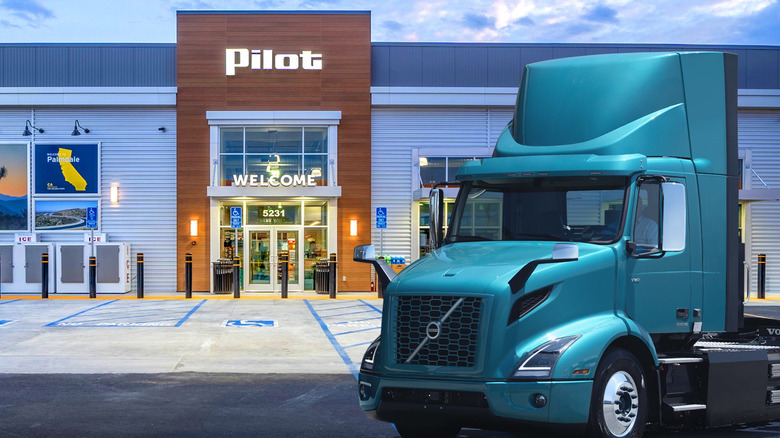Volvo And Pilot Team To Launch Semi Truck EV Chargers At Travel Centers
Pilot and Flying J travel centers are a hotbed of large commercial vehicles, namely semi trucks hauling loaded trailers. Trucking isn't going away any time soon, but the nature of these vehicles is evolving rapidly, and all signs point toward traditionally fueled big rigs eventually becoming a thing of the past. Though EVs hold a lot of promise, the commercial sector faces the same general issue many individuals face, too: inadequate charging options in many places.
Pilot and Volvo have announced a new partnership that will help address that by bringing commercial electric vehicle chargers to travel centers throughout the United States (via PRNewswire). These EV chargers will be installed at both Pilot and Flying J destinations, paving the way for the electrified semi trucks of the future to recharge their batteries while drivers stop for a meal or a few hours of sleep. Increasing the EV charging infrastructure throughout the U.S. has been a priority for the current administration (via The White House), and it remains a key aspect of phasing out emissions-heavy transportation that utilizes internal combustion engines.
The charging network will support Class 8 trucks
According to a press release from Pilot Company, this charging network will support Class 8 vehicles, which refers to medium- and heavy-duty trucks. Truck drivers will be able to find these chargers at some Flying J and Pilot travel centers once they're installed, with Pilot noting that they will be "ideally positioned along transportation corridors." Multiple factors will influence which destinations receive these vital chargers, including everything from the public funds available to help support the electricity-chugging installations to the routes where EV big rigs will be most dense.
Though we've seen some EV semi-truck concepts — including Tesla's own electric semi — these vehicles don't currently play a major role in delivering goods across land. By installing charging networks on popular long-haul routes, the two companies may help nudge the industry toward electrification — something that will come with multiple benefits, the most significant of which is cutting down on the emissions that contribute to climate change.
The automotive industry as a whole is skewing toward electric, and that's not likely to change. Consumer interest in these vehicles has steadily increased and high-speed charging opportunities are more plentiful than ever. Some automakers have already revealed the dates for their own phase-out of gasoline-powered cars, while some cities and countries have revealed that we're not too far away from a future in which they will no longer allow new ICE vehicles to be sold.

